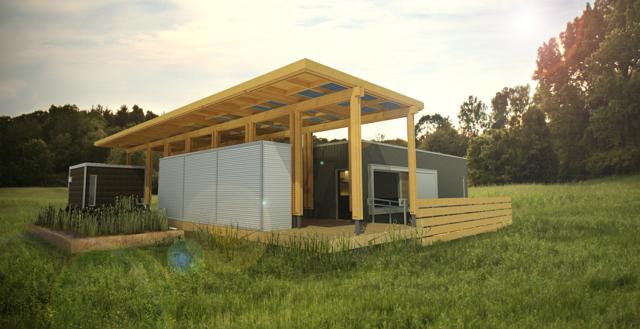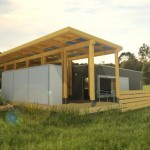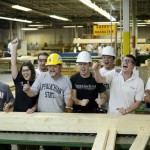- Solar homestead: A compact design mimics old-time mountain homesteads, where outbuildings can be customized to serve as a garden shed, picnic shelter, or outdoor kitchen, while allowing homeowners to add square footage and solar collection to suit their needs. For more, see www.thesolarhomestead.com. Courtesy of ASU Solar Homestead Project.
- Celebrating the future: Members of the construction and communication teams celebrate the progress made on The Solar Homestead at ASU. Left to right: Kenric Hartman, Janelle Wienke, Ed Pavia, Joe Armstrong, Trevor Hogan, John Arnaud, Bret Sowers, David Lee.
Who says there’s nothing new under the sun? Inspired by the days when isolated homesteads dotted Western North Carolina, a team of Appalachian State University students has designed a self-sufficient, “zero-energy” homestead that embraces the future. And this month, their creation goes head-to-head with 18 other entries in the U.S. Department of Energy’s Solar Decathlon.
The ASU entry features a compact, 864-square-foot home; outbuildings like those found on old-time homesteads expand solar-collection possibilities and overall square footage. The highly respected biennial competition challenges collegiate teams from around the world to design and build innovative, solar-powered dwellings. Each team must create a cutting-edge home that’s cost-effective, energy-efficient and attractive, and then install it in a special exhibit on the National Mall in Washington, D.C. (see box, “See For Yourself”).
A multidisciplinary collective of ASU students and faculty accepted the challenge. Recent ASU graduate (and Asheville High alumna) Janelle Wienke learned about the project when it was offered as a special course for credit; by that time, faculty advisers Jamie Russell, Chad Everhart and Jason Miller (all from the school’s Department of Technology and Environmental Design) had already begun enlisting student energy and talent for a competition entry.
Eight graduate students developed the initial proposal in the fall of 2009. As the project progressed, that core team interviewed additional participants to help meet a wide range of needs: engineering and construction expertise, a detailed project manual, a marketing plan, a health-and-safety plan, a website and videography (required by the judges and also needed to create multimedia presentations used for fundraising and public outreach).
Dave Lee, a grad student in appropriate technology, headed up a team that raised more than $700,000 from major donors; the N.C.-based Lowe’s kicked in $350,000.
By last fall, the project’s human capital had swelled to include Wienke, the outreach coordinator, along with some 200 other students and faculty representing numerous disciplines. Small groups developed the home’s unique, two-faced solar panels (which boost solar capture by 30 percent); reinvented the Trombe wall to store and slowly release heat to the interior; and built several required small-scale models of their homestead’s final design. Sacrificing holidays and weekends, many core team members worked 100-hour weeks to meet project deadlines, Lee reports.
The hard work paid off, though; by this spring, the team had survived two elimination rounds, and Lee says they’re well-positioned to stack up against the competition. On Sept. 8, team leaders set off for D.C. with their creation packed onto four tractor-trailers; once there, they’ll install it on the Mall, along with live landscaping, as part of a 10-day “solar village” exhibit.
“It’s a huge honor for ASU,” says Wienke. “We’re one of two teams chosen that doesn’t have an architecture or engineering program.” What’s more, she emphasizes, “This is really a student-designed, -built and -run project.” ASU Chancellor Kenneth Peacock, notes Wienke, has enthusiastically supported the project, helping the group find a vacant auto dealership near campus with the tall bays needed to build and ship big project components.
“They’ve been amazing to let us do this the way we like,” Wienke reports, adding, “The chancellor is our biggest cheerleader.”
Among the Solar Decathlon’s goals is spawning innovation in solar engineering and design; Lee cites several the ASU team has come up with. Instead of a conventional water heater, for example, they used a tank filled with paraffin wax, which stores heat more efficiently. An enclosed coil transfers the heat to the water pumped through it.
Aesthetics also influenced the home’s design. Its photovoltaic panels, for instance, are placed on a “solar canopy,” creating a porch that recalls those found on old-time mountain cabins.
“A lot of solar panels are just sort of tacked onto a roof,” Wienke explains. “We didn’t think that was the most attractive way. The unique aspect of our panels is they are bifacial: They collect energy from both sides (that is, direct solar energy from above and reflected light from below) … and they let this great light filter through.”
Such innovations also give the university a tangible entrepreneurial boost. ASU already holds two patents for advanced technology, notes Lee; this project will enable the school to apply for four more, “so they’re tripling the intellectual property of the university.”
— Send your local environmental news and tips to sandrew@mountainx.com, or call 251-1333, ext. 153.





Before you comment
The comments section is here to provide a platform for civil dialogue on the issues we face together as a local community. Xpress is committed to offering this platform for all voices, but when the tone of the discussion gets nasty or strays off topic, we believe many people choose not to participate. Xpress editors are determined to moderate comments to ensure a constructive interchange is maintained. All comments judged not to be in keeping with the spirit of civil discourse will be removed and repeat violators will be banned. See here for our terms of service. Thank you for being part of this effort to promote respectful discussion.